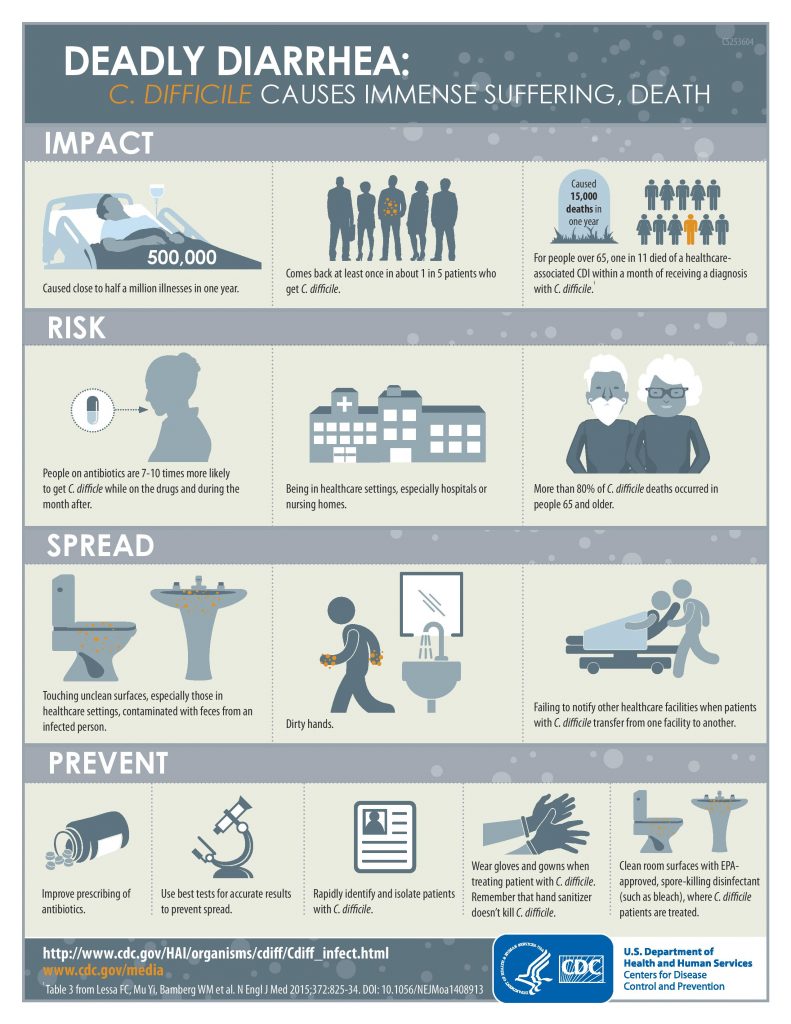Check out our latest professional janitorial services tips to clean and disinfect surfaces contaminated with C. Difficile.

Professional Janitorial Services Tips for Disinfecting C. Diff
Clostridium Difficile (C. diff) is a common and deadly healthcare-associated infection (HAI) that flourishes in the human intestine and colon during antibiotic treatments, which kill the normal bacterial flora in our digestive systems.
According to the University of Minnesota, Center for Infectious Disease Research and Policy (CIDRP);
On the basis of a 2011 study, the Centers for Disease Control and Prevention (CDC) has increased its estimate of the annual burden of Clostridium Difficile infections in the United States, putting it at 453,000 cases per year, with 29,300 associated deaths.
The agency, which released the findings in the New England Journal of Medicine (NEJM), said they point up the need for better antibiotic stewardship and rigorous infection control in healthcare facilities.
C diff infections occur when someone is exposed to the pathogen while receiving antibiotic treatment for some other illness. Antibiotics suppress the normal bacteria in the colon, allowing C diff to flourish, producing toxins that cause severe diarrhea. Damage to the colon can cause bacteria to leak into the bloodstream.
The CDC found that about two thirds of the 453,000 cases were related to a stay in a hospital or nursing home and the other third were community-associated cases, involving people with no recent hospital or nursing home exposure. Most of those who died were elderly.
C. Diff FAQ
Q: What is the Human and Financial Cost of C. Diff?
A: C. Nearly half a million people are infected with C. diff each year.
This has led to devastatingly high numbers of preventable infection, loss of life, and healthcare costs.
According to the CDC;
More than 100,000 of these infections developed among residents of U.S. nursing homes.
Approximately 29,000 patients died within 30 days of the initial diagnosis of C. difficile. Of those, about 15,000 deaths were estimated to be directly attributable to C. difficile infections, making C. difficile a very important cause of infectious disease death in the United States. More than 80 percent of the deaths associated with C. difficile occurred among Americans aged 65 years or older. C. difficile causes an inflammation of the colon and deadly diarrhea.
Previous studies indicate that C. difficile has become the most common microbial cause of healthcare-associated infections in U.S. hospitals and costs up to $4.8 billion each year in excess health care costs for acute care facilities alone. The new study found that 1 out of every 5 patients with a healthcare-associated C. difficile infection experienced a recurrence of the infection and 1 out of every 11 patients aged 65 or older with a healthcare-associated C. difficile infection died within 30 days of diagnosis
Nearly half a million Americans suffered from Clostridium difficile infections in a single year
Q: Who is at Risk?
A: C. diff most commonly affects those actively taking antibiotics for up to a month after they have ceased taking the medication.
C. diff is often the result of HAI resulting from cross-contamination leading to infection during or after surgery and is most prolific in adults, 65 and older, especially those living in nursing homes.
The bacteria can also affect those with already weakened or compromised immune systems, as well as those suffering from other intestinal problems, such as inflammatory bowel syndrome or colorectal cancer.
Additionally, those who have previously suffered from a C. diff infection are more likely than those who have never encountered the disease to be reinfected.
Source:
Q: How is C. Diff Spread?
A: C. diff bacteria exist throughout nature, and is commonly found in soil, water, processed food, as well as being naturally occurring in the digestive system of a small group of healthy adults, and is spread by coming into contact with an infected surface contaminated with human or animal feces, typically as a result of poor sanitation and hand-hygiene.
According to the Mayo Clinic;
C. difficile infection is most commonly associated with health care and recent antibiotic use, occurring in hospitals and other health care facilities where a much higher percentage of people carry the bacteria.
However, studies show increasing rates of community-associated C. difficile infection, which occurs among populations traditionally not considered high risk, such as children and people without a history of antibiotic use or recent hospitalization.
Spores from C. difficile bacteria are passed in feces and spread to food, surfaces and objects when people who are infected don't wash their hands thoroughly.
These spores can persist in a room for weeks or months. If you touch a surface contaminated with C. difficile spores, you may then unknowingly swallow the bacteria.
Green Cleaning Tips
According to a recent article published by MD Magazine, researchers in the Netherlands discovered that, regardless of disinfectant type, impregnated cleaning wipes were more effective than spray disinfectants using the same chemical.
The team first looked at hydrogen peroxide 1.5% (Aseptix Sterimax Sporicide wipes); glucoprotamin 1.5% (Incidin plus wipes); a mixture of ethanol, propane and N-alkyl amino propyl glycine (Bacillol 30 tissues); and finally, a mixture of didecyldimonium chloride, benzalkonium chloride, polyaminopropyl, biguanide and dimenthicone as active ingredients (Formula 429 spray).
...
Of all the disinfection methods, the most effective was the hydrogen peroxide wipe, even beating out the hydrogen peroxide spray.
Additionally, they found that wipes performed better than the sprays with the same active ingredient.
The researchers acknowledged that the argument could be made that sprays included the use of paper towels for wiping the tiles, but they cited another study which compared microfibers, cotton cloths, sponge cloths and paper towels for their decontamination abilities and did not find a significant difference.
References & Resources
Takeaway
Instances of C. diff infections continue to rise, as well as the cost in financial resources and human life.
The challenge can be addressed head-on with a combination of cost-effective green cleaning services and improved hand-hygiene practices.
If you would like to learn more about the advantages of outsourced janitorial services and sustainable green cleaning practices to eliminate C. diff infections, contact us today for a free quote!
In Bakersfield CA, call (661) 437-3253
In Fresno CA, call (559) 206-1059
In Valencia CA, or Santa Clarita CA, call (661) 437-3253



You must be logged in to post a comment.